Spresense – key functions and features
-

Integrated GPS
The embedded GNSS with support for GPS, QZSS and GLONASS, making it possible to receive multiple system simultaneously and highly accurate position measurement.
-

Advanced digital audio codec and amplifier
Equiped with Hi-res audio output (192kHz/24bit), multi mic inputs support for up to 8 channels, and Class-D digital amplifier
-

Multicore microcontroller
Equipped with 6 ARM® Cortex®-M4Fs for low power consumption driving
Click here for further information such as how to install the development environment and sample codes, etc.
「SPRESENSE」 About Main Board
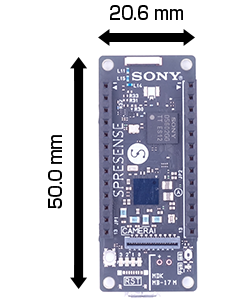
| Model number | CXD5602PWBMAIN1 |
|---|---|
| CPU | Equipped with 6 ARM® Cortex®-M4Fs |
| Maximum clock frequency | 156MHz |
| SRAM | 1.5MB |
| Flash memory | 8MB |
| Digital input/output | GPIO, SPI, I2C, UART, PWM, I2S |
| Analog terminal | 2ch (0.7V range) |
| GNSS | GNSS, GPS(L1-C/A), QZSS(L1-C/A),
GLONASS(L1), WAAS, QZSS(L1-S) |
| Software | Spresense Arduino Library (Arduino IDE)
Spresense SDK (GNU Make) |
| Other | Camera interface |
「SPRESENSE」 About Extension Board
-
Main Board
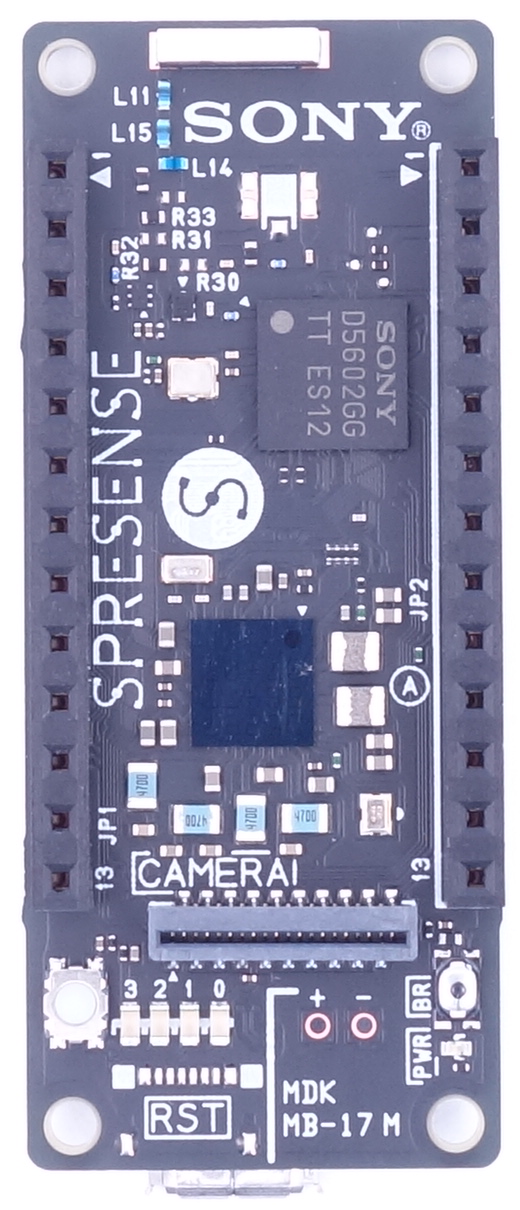
-

-
Headphone
terminal
Microphone
terminal
microSD
card slot
I/O voltage conversion
1.8V→3.3V or 5.0V
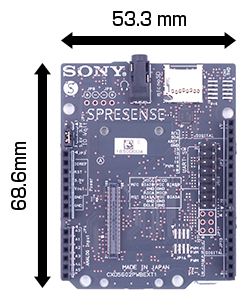
| Model number | CXD5602PWBEXT1 |
|---|---|
| Audio input/output | 4ch analog microphone input or 8ch digital
microphone input, headphone output |
| Digital input/output | 3.3V or 5.0V |
| Analog input | 6ch (5.0V range) |
| Other | microSD card slot |
*The extension board will not operate without the mainboard.
「SPRESENSE」 About Camera Module
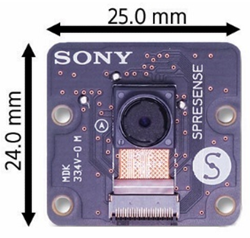
| Model number | CXD5602PWBCAM1 |
|---|---|
| Number of effective pixels | 2608(H) x 1960 (V) = approx. 5.11 M pixels |
| Operation voltage | DC 3.7V |
| I/O voltage | DC 1.8V |
| Camera interface | CMOS 8 bit parallel |
| Output format | Y/C, RGB, RAW and JPEG |
| Control interface | I2C |
| Built-in filter | IR cut filter |
| FOV | 78°±3° |
| Depth of field | 77.5cm ~ ∞ |
| F value | 2.0±5% |
| Focus | Fixed focus |
「SPRESENSE」 Other Related Products
Sensor Related Products
-
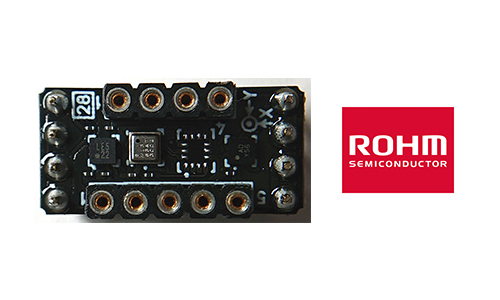
SPRESENSE-SENSOR-EVK-701
- Acceleration, pressure, and geomagnetism data sensor functions which are indispensable for motion sensing
- It can as be extended with more than 7 sensor functions such as illuminance and proximity, color, magnetism, temperature, ultraviolet light, pulse wave.
-
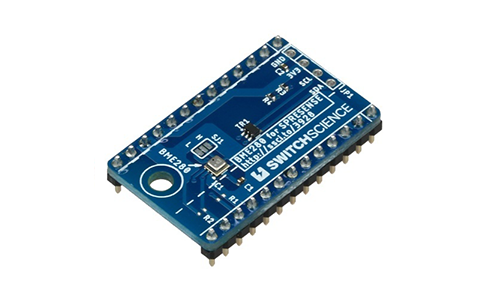
SSCI-039284
- Temperature, humidity, and pressure sensors
- Equipped with Bosch’s BME280
- Equipped with 3.3V I2C terminal for extension
-
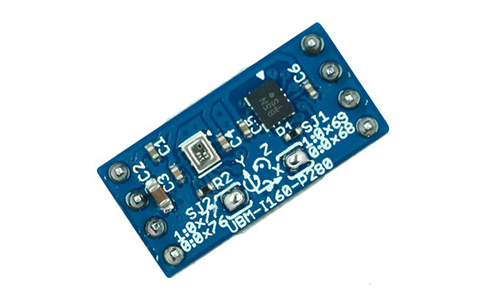
SSCI-052580
- 3-axis accelerometer, 3-axis gyro,pressure, temperature sensors
- Equipped with Bosch’s BMP280/BMI160
-
Bluetooth
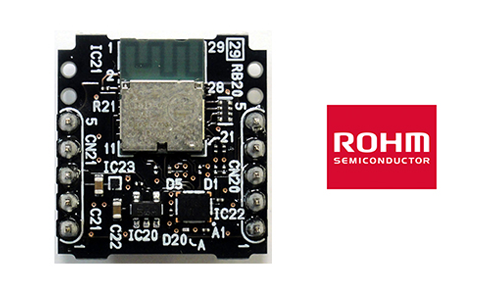
SPRESENSE-BLE-EVK-701
- Built-in antenna
- TELEC, FCC, CE, IC Radio Law certification has been acquired
- Simple communication confirmation with smartphone is possible with smartphone application “BLE Tool”
-
Wi-Fi

iS110B
- Built-in antenna
- TELEC (technical standards compliance)/FCC/CE certified
- Equipped with Telit’s GS2200MIZ
- Conform to the standard of IEEE802.11b/g/n (2.4GHz)
-
Related accessories
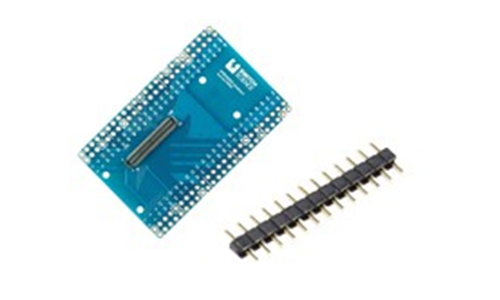
- Universal board
- Conversion board
- Pin header
- Mini spacer
-
Extension board
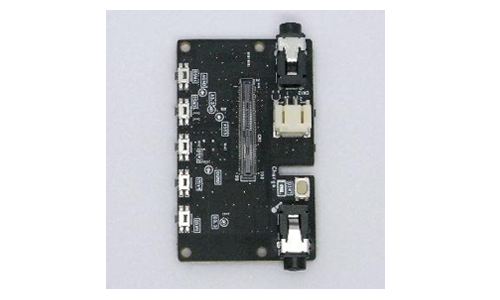
PDA01
- Equipped with 8 push switches
- Equipped with Kionix’s KX122-1037
- Equipped with 3.5mm stereo headphones/stereo microphone
Power supply method for Spresense main board
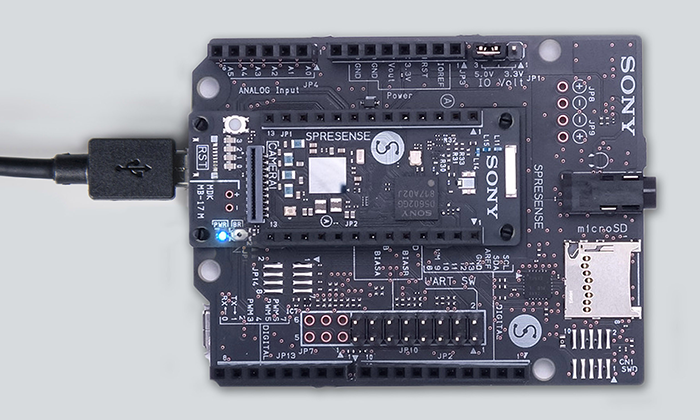
- Use the main board’s mico USB connector. (Also available to program) The micro USB port is recognized as a serial port by the PC.
- Connect a 5V±0.25V power source to the VOUT pin on the extension board, this is convinient when supplying power from another board. ※If you connect a power source with a voltage less than a range of 5V±0.25V, the main processor may be destroyed.
- If you are using the Spresense extension board the micro USB connector on the extension board can be used to power the system when the two boards are being used as a set. The micro USB port on the expansion board side is recognized by the PC as MSC (Mass Storage Class)
- The Spresense can be powered by a USB battery pack. For reliable USB battery pack operation choose a battery pack that has an “always on” feature or use a USB “keep-alive load”.
Edge AI system development
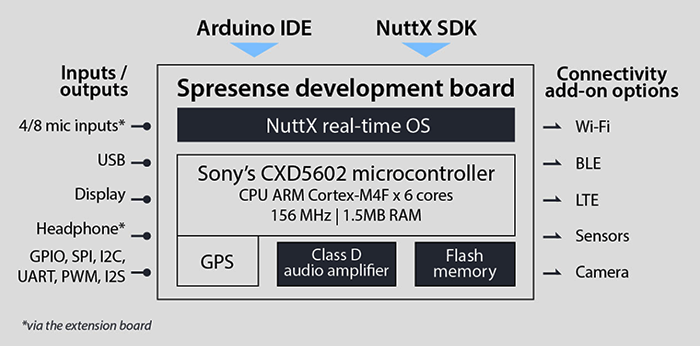
By linking with Sony’s Neural Network Console, it is possible to easily build edge AI systems that had been high hurdles until now. For those looking for full-fledged embedded development, the NuttX-based Spresense SDK lets you take full advantage of the power of Spresense.

